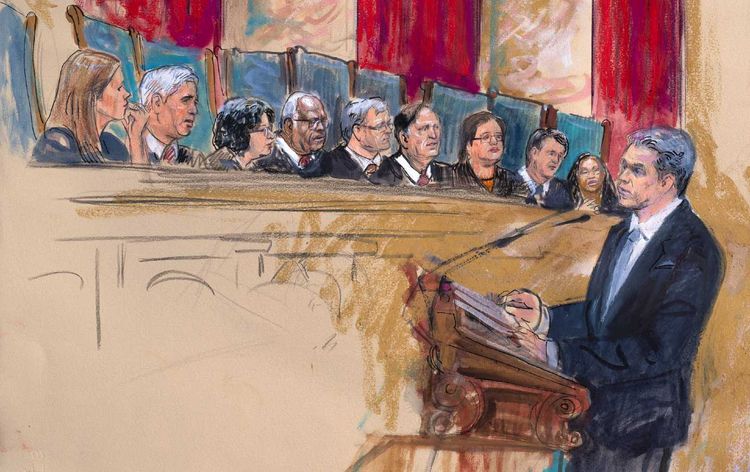The Supreme Court Is Not Going to Save Us From Donald Trump

The political landscape shifted dramatically on February 9, 2024. There was a significant change in the way politics operates on February 9, 2024.

The members of the Supreme Court have stated that they don't believe the 14th Amendment forbids Trump from participating in elections. This indicates that the sole approach to prevent him from obtaining office is through the electoral process.
A drawing by an artist shows lawyer Jonathan Mitchell presenting his case to the Supreme Court in defense of ex-president Donald Trump. This took place on Thursday, February 8, 2024, in Washington, D.C.
Yesterday, the highest court in the United States heard arguments in the case of Trump v. Anderson. The case involves whether or not former president Donald Trump can be prevented from appearing on the presidential primary ballot in Colorado, in line with Section 3 of the 14th Amendment, due to his efforts to overturn the 2020 election. It appears likely that the court will overturn the Colorado Supreme Court's decision and allow Trump to be placed on the ballot. Moreover, it seems plausible that a unanimous 9-0 decision will be made, with all judges agreeing that insurrectionists should not hold office, and they may even include some humorous remarks about the amendment.
It wasn't surprising that the six conservative judges came to this decision, despite what the text said. I believed that Chief Justice John Roberts would put effort into creating an opinion that would make it appear less biased. However, it seems that Roberts won't need to persuade the liberal judges as two of them appeared just as enthusiastic about Trump's candidacy as a person wearing a MAGA hat in a cafe.
During the Supreme Court session, Jonathan Mitchell, who was representing Trump, did not make a good argument. Mitchell, previously known for creating the anti-abortion bill in Texas, spent a lot of time contradicting himself. The judges even had to suggest arguments for him to make in order to help his case, but he argued against them or refused to make the point. For example, when there were justices interested in arguing that Trump was denied due process in the Colorado proceeding, Mitchell almost refused to make that point. Trump would be upset and frustrated if he was able to understand the Supreme Court session and how Mitchell represented him.
However, it was not until Jason Murray, who represented the attempt to prevent Trump's name from appearing on the election ballot, began to speak that the judges started to reveal their opinions. Roberts, Alito, Kavanaugh - who has been accused of attempted rape in the past - and Barrett, inquired as to why Colorado should have the power to make decisions for the entire nation regarding who can run for office.
Murray provided a convincing response that is commonly accepted in conservative communities - the concept of states' rights. He explained that Colorado has the autonomy to decide on its own election regulations, and the Constitution accords extensive authority to the states to establish their own election procedures for federal representatives. This is frequently employed by conservatives to defend the states' right to impose voter ID regulations, discontinue early voting, or enact any statutes that might restrict voting rights and make it more difficult for underprivileged, or non-white voters to vote.
However, the idea of states having the power to make their own decisions did not appease the conservatives. Justice Elena Kagan shared the same worries as the conservatives and was not convinced. She felt that if the court upheld the Colorado ruling, it would result in a lack of consistency. Just like Roberts and Alito, Kagan kept bringing up hypothetical scenarios in which one state would not allow Trump to run while another would exclude different candidates, which would lead to a situation where every state's presidential election ballots would be completely different.
Murray provided an answer to the question which seemed believable. He stated that we should have faith in states to implement their own laws with honesty. He also mentioned that an insurrection is not a common occurrence and it is unlikely that states would use the standard for political purposes. However, we are aware that Murray's aspirations are incorrect since we have witnessed examples of what governors in red states such as Greg Abbott and Ron DeSantis are capable of doing. Regardless, when it comes to legal matters, the court should not base its decisions on what it thinks dishonest politicians will do with those decisions. If the court is genuinely worried about deceitful political tactics, they should first apply that standard to their rulings on voting rights and gerrymandering, instead of only becoming concerned when an insurrectionist runs for president.
Kagan and Jackson weren't convinced by Murray's optimistic predictions. Jackson expressed similar concerns as Kagan, but also argued that the President does not qualify as an "officer" according to the 14th Amendment. This assertion is absurd, as it was originally put forth by a Colorado trial court to prevent Trump from being removed from the ballot. Many conservatives have since suggested it as a potential loophole. Jackson is known for being a strict "textualist" and sticking to the true meaning of words, but doesn't get bogged down in linguistic debates like other justices, such as Gorsuch. She always keeps the bigger picture in mind.
Yesterday, she delved into the details of the 14th Amendment and noticed that it doesn't explicitly mention the presidency when preventing insurrectionists from holding certain offices. Despite overwhelming historical evidence, she didn't seem to be convinced that the amendment was created to prevent a president who incited insurrection from running again. Instead, she posited that the authors were solely focused on preventing Confederate sympathizers from being elected in local or state elections in the South, and didn't consider if they could be elected as president of the entire country.
It's likely that The Wall Street Journal and National Review will publish articles commending Jackson for her steadfastness in the midst of political pressure. I believe that Kagan and Jackson are principally concerned about battleground states removing Joe Biden from the ballot instead of strongly democratic states removing Trump. This mindset is key to interpreting their political decisions in this current situation.
During the hearing, Justice Sonia Sotomayor, the most experienced leftist judge, appeared to remain doubtful about Trump's argument, but her attitude conveyed a sense of acceptance to the outcome. Her line of questioning was not as forceful as it usually is, and she did not exhibit any signs of being the only one to disagree in an 8-1 verdict. Rather, she seemed to aim for a significant reference in an opinion that everyone can agree on.
I was disappointed by the lack of dissenting opinions from the liberal side during the hearings. I think that Chief Justice Roberts is highly motivated to find a resolution that satisfies everyone, with a 9-0 decision being ideal. Had the liberal side put up more of a fight, it might have incentivized Roberts to offer concessions in order to gain their support in future Trump-related decisions that will come before the court. For instance, a 9-0 ruling on this case could have been paired with a promise to not grant immunity to Trump in another case. Alternatively, they could have reached an agreement to hold the insurrectionists accountable for their actions on January 6th. Despite the justices' claims that they do not engage in horse-trading, I believe that it happens frequently. This was a missed opportunity for the liberal side to extract something for their votes, as they were more focused on stopping Republican efforts to remove Joe Biden from the presidential ballot in Texas.
Slide to the left to see additional authors.
I've mentioned many times that it's highly unlikely that the Supreme Court would permit the Republican nominee from being removed from the ballot. I've mentioned many times that judges and courts lack the bravery and resolve to legally terminate Trump's presidential campaign. I've said many times that the sole method of doing away with him is by defeating him at the polls again and resisting his followers who will attempt to seize the election once again.
The cautions are still applicable despite the discussions made in court. It is important to note that we cannot rely on the law to rescue us. The Supreme Court's stance on "states' rights" reveals that they are implemented to make it more challenging for individuals to vote rather than deterring rebellion groups from taking over.
Elie Mystal works as The Nation's justice correspondent and hosts a legal podcast called Contempt of Court. Additionally, he is a fellow at the Type Media Center under the Alfred Knobler program. Elie has written the New York Times bestseller Allow Me to Retort: A Black Guy's Guide to the Constitution and it has been published by The New Press. You can keep up with Elie's work by following him on Twitter @ElieNYC.









































